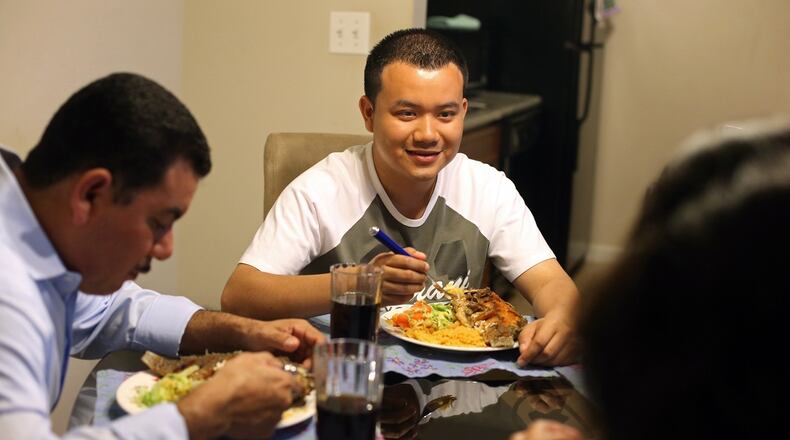Rigoberto Rivera ventures outside his Roswell apartment four or five days a week to pay his bills. Some days, the Roswell High School graduate joins his parents in cleaning houses. On other days, Rivera washes dishes, makes salads and prepares takeout meals at a local Italian restaurant.
He and his parents don’t have the option to work from home. Lacking health insurance or paid sick leave, they are among one of the most vulnerable groups amid the coronavirus pandemic: Immigrants living in the shadows without legal status.
Georgia was home to an estimated 400,000 unauthorized immigrants in 2016. Already rattled by the Trump administration’s crackdown on illegal immigration, many work in some of Georgia’s largest industries, including hospitality, farming and poultry processing.
“We don’t have any symptoms right now,” said Rivera, 30, who was brought here as a child from Mexico and who has received a temporary reprieve from deportation through the Deferred Action for Childhood Arrivals program. His parents separately crossed the southwest border without legal permission. “We are just trying to protect ourselves. We wear face masks and are keeping our distance.”
To stop the spread of the disease, advocates are pushing the Trump administration to soften its immigration enforcement.
“If they are afraid to get tested and it starts running rampant in their communities, it is only going to make it worse for us,” said Charles Kuck, a local immigration attorney and a past president of the American Immigration Lawyers Association. “It is not going to stay isolated in one place.”
U.S. Immigration and Customs Enforcement announced this month that it would delay enforcement against people who are not considered public safety risks and would also generally not pursue them in hospitals, doctor offices and health clinics.
On Tuesday, ICE reported its first COVID-19 case among its detainees, identifying the patient as a 31-year-old Mexican national who is being held at the Bergen County Jail in Hackensack, N.J. The agency has not reported any cases among its detainees in Georgia.
In 2018, 23% of nonelderly immigrants with legal status and 45% of unauthorized immigrants lacked health insurance, according to the Kaiser Family Foundation, a nonprofit that focuses on national health issues. Trump told reporters at the White House Sunday that unauthorized immigrants can seek coronavirus testing without fear of being reported to the authorities.
Seeking medical care for COVID-19 won't negatively affect people pursuing legal status under the Trump administration's tough new public assistance rules for immigrants, according to U.S. Citizenship and Immigration Services.
Meanwhile, Atlanta-area doctors are fielding calls from worried refugees, many of whom are still learning English. The doctors are urging them to routinely wash their hands, limit contact with others and not seek testing for COVID-19, if they don’t have symptoms.
"The first thing they are facing is a lack of resources and education tailored to them and their languages," said Dr. Heval Kelli, who came here as refugee from Syria and who now works as a cardiology fellow at Emory University. "It makes it very hard to convince them this is a very serious thing."
The Clarkston Community Health Center, a free clinic that serves many immigrants and refugees, was forced to temporarily close this month because of the pandemic. But its doctors are taking calls from patients and will soon begin seeing them through telemedicine technology.
"Whatever it is that you and I are fearing, their fears are so much more exaggerated," said Dr. Gulshan Harjee, one of the center's founders. "What about these people with $9-an-hour jobs? How will they be doing?"
Meanwhile, Atlanta's International Rescue Committee, a refugee relocation agency, has started a GoFundMe campaign to raise private donations for refugees' rent, utilities and other needs during the pandemic.
Among the refugees the IRC is considering helping with the campaign is a client, Patrick Baraka, 24, of Clarkston. He arrived in Georgia last year after fleeing tribal violence in his native Democratic Republic of Congo. He lost his welding job last week, so he is looking for a new position to pay his rent and support his wife and two-year-old twins, who live in Uganda. He is seeking to bring them to America.
Like Rivera, Baraka does not have health insurance or the option to work from home.
“I have got no money,” Baraka said. “I am just wondering how I am going to survive.”
About the Author
Keep Reading
The Latest
Featured


